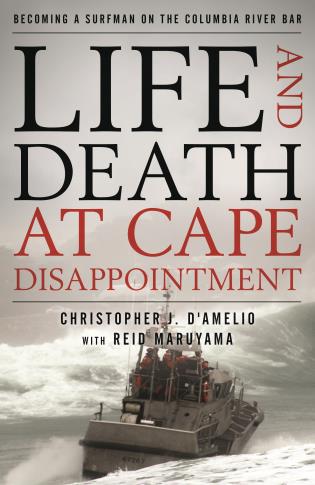Reviewed by1
Commander Donald A. Baker U.S. Navy
Assistant Professor, JFSC
A rabbi once said, “Greater love has no one than this: than to lay down one’s life for their friends.” If risking one’s life and limb is any indication of an individual’s demonstration of their love, then in his memoir Life and Death at Cape Disappointment Coastguardsman Chris D’Amelio’s very personal and intimate account of rescuing his fellow citizens is a consummate example of what the maxim looks like in practice.

As a qualified surfman, the Coast Guard’s highest small boat qualification, D’Amelio had firsthand experience performing search and rescue (SAR) missions from his post at Coast Guard Station Cape Disappointment—a section ominously nicknamed “The Graveyard of the Pacific” for its treacherously dangerous and volatile sea conditions—from the late 1990s to the mid2000s. D’Amelio’s memoir recounts the most noteworthy of his documented 430 SAR cases, one of which earned him national recognition.
The book introduces the uninitiated to life as a Coastguardsman at a duty station where the physical limits of human and machine (not to mention the psychological strain that comes with putting one’s life in perilous situations) are put to the test as frequently as the tide shifts directions in the Columbia River. D’Amelio’s first-person perspective and tone throughout the book is not altogether different from war memoirs like With the Old Breed or Helmet for My Pillow. The first-person point of view provides authors a vehicle to relay their thoughts and emotions to the reader. D’Amelio’s prose is basic and much less refined than Sledge or Leckie’s, but the simplistic style adds an element of authenticity that will likely resonate with both the military and civilian reader. A second common feature of military autobiographical works is that the protagonist typically lives through some harrowing encounter with a fierce enemy combatant amidst dire environmental conditions. Life and Death continues the tradition of other war books in the sense of dangerous encounters but here, violence and destruction come from the strong hand of the sea where his crew battle storm-forced winds and intense wave-sets that often exceed twenty feet in height in the small surfman vessels. Not all battles with Mother Nature are won, as D’Amelio attests. Some of his calls for assistance end in fatal disappointment, hence the namesake of the Coast Guard station and a portion of the title.
D’Amelio largely succeeds in his endeavor to tell the stories from his time at Station Cape Disappointment. He recounts rescuing a brother and sister who fell off a cliff, aiding a fisherman who burned his face off when his engine caught fire, retrieving a suicide victim’s body, and responding to the capsized boat that caused the drowning of its operator. Those stories, amongst many others, are particularly captivating. His surfman magnum opus is what he refers to as the “Peacock Spit Case,” where D’Amelio and his crew saved three family members from inevitable drowning after their boat flipped in heavy surf. For his action, D’Amelio received the Association for Rescue at Sea Gold Medal.
As captivating as his narratives are, he unknowingly creates uncertainty in certain places through his diction. He cannot remember if it is “nine or ten” fishing boats that got stuck out at sea or the average number of dead bodies each Coast Guard member of his station retrieves from the water, guessing at maybe “two or three a year.” Of particular concern is the status of a rescued burn victim. D’Amelio admittedly recalls the details differently than another crew member on the same case. There are numerous such instances in the book that create both drama and frustration for the reader. The effect of ambiguous language on vital details calls into question how accurately D’Amelio recalls the events but his honesty admitting the lapses in memory lend to his attempt at sincerity.
Regardless of its shortcomings, the book achieves the goal of adequately depicting the surfman’s experience at Cape Disappointment. As much as D’Amelio’s volume captures his official search and rescue vocation, it is equally a very personal journal that chronicles his family life as a husband and father and all the nuances within. He acknowledges mistakes made in both his personal and professional lives. Still, he navigated both to success as he completed a noteworthy career as Chief Warrant Officer 3, which is only surpassed by his successful marriage and raising of three children. The personal sacrifice in terms of the tension between career and family is the book’s strength and greatest success. Though few servicemembers may have the same experiences, the sacrifice necessitated by service to country and community will be something all readers can identify with. D’Amelio’s is an honest, open, and raw story of one man’s life voyage that happens to include his precarious time as surfman that will not leave readers disappointed.2
Book Information:
Life and Death at Cape Disappointment: Becoming a Surfman on the Columbia River Bar
by Christopher D’Amelio and Reid Maruyama
Lyons Press, 2021. 224 pp.
1 The views expressed are those of the author(s) and do not reflect the official policy or position of Joint Forces Staff College, National Defense University, the Department of Defense, or the U.S. Government.
2 A version of this book review previously appeared in the Naval Historical Foundation. It is reprinted here with permission, https://www.navyhistory.org/2021/08/life-and-death-cape-disappointment/
 Download the PDF version: click here
Download the PDF version: click here